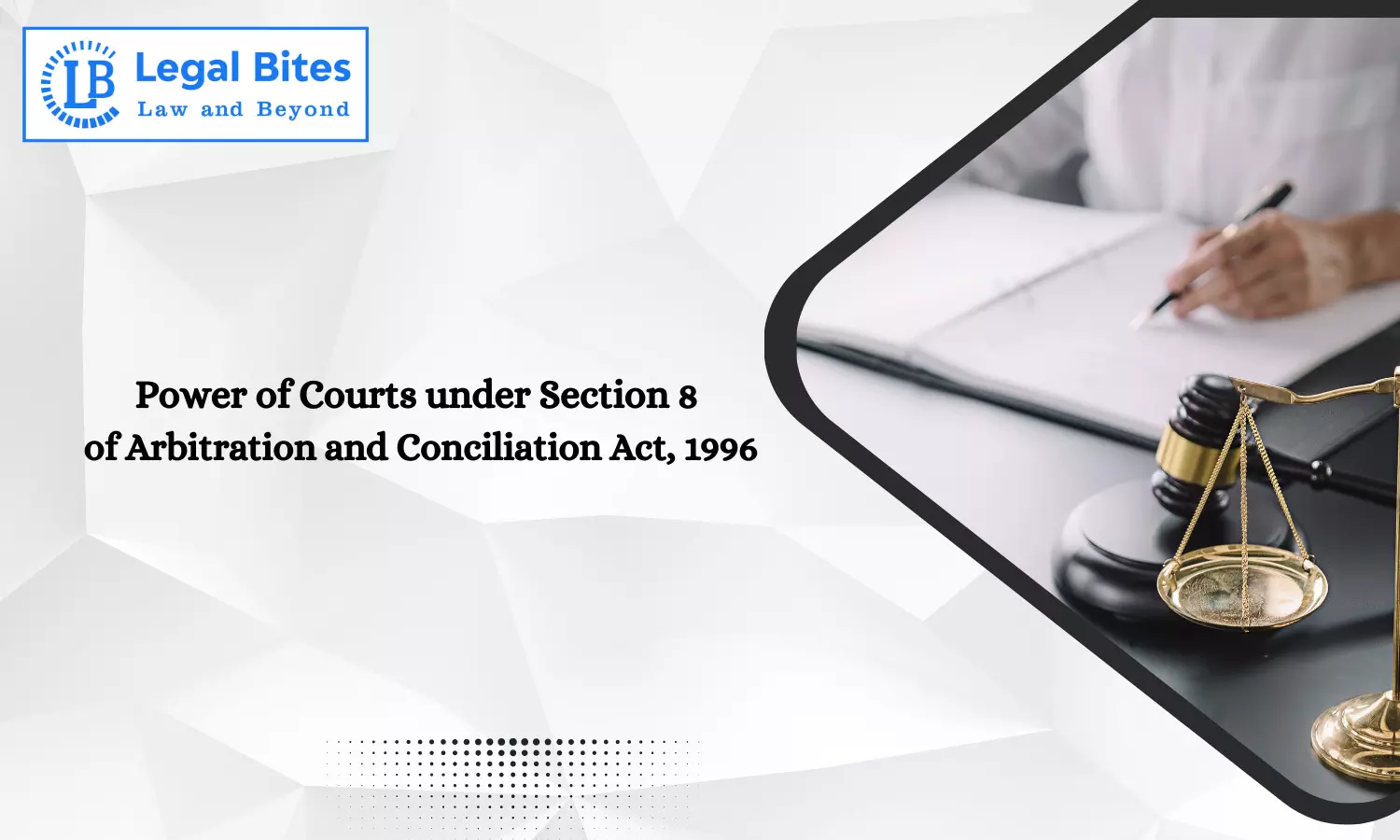Power of Courts under Section 8 | Arbitration and Conciliation Act, 1996
Section 8 of the Act that refers the parties to arbitration in case of an arbitration agreement.

The article 'Power of Courts under Section 8 of Arbitration and Conciliation Act, 1996' delves into the matter of whether, when confronted with a situation where an arbitration agreement is in place and one party commences legal proceedings in contravention of that agreement, the court is obliged to direct the parties to engage in arbitration.
Introduction
The Arbitration and Conciliation Act of 1996 (“the Act”) restricts the Court’s interfering in the matters of arbitration to attaining their goal of achieving swift justice. Section 8 of the Act refers the parties to arbitration in case of an arbitration agreement. The section states:
When a matter subject to an arbitration agreement is brought before a judicial authority, that authority must, upon application by a party to the arbitration agreement or someone connected to them, refer the parties to arbitration. This referral should happen before the party submits their first statement on the substance of the dispute. However, the judicial authority can avoid this referral only if it is clear on the face of it that there is no valid arbitration agreement in place.
Without the original arbitration agreement or an adequately certified duplicate of it, the application mentioned in subsection (1) will not be considered:
The party applying for a reference to arbitration must submit the request attached with a copy of the arbitration agreement and petition asking the Court to order the opposite party to produce the primary arbitration agreement in case the party does not have access to a certified copy of it.
An arbitration may be started or continued, and an arbitral award may be made even though a request is made and the judicial authority is handling the matter.
Previous Conditions Applicable under the section
In the past, a judicial authority may order the parties to resolve their matters through arbitration based on a mutual arbitration agreement. Thus, prerequisites shall meet before a reference can be made by the provision of the Act. In the case of P. Ananad Gajapati Raju & Ors. v. P.V.G Raju (Died) & Ors., it was stated:
"the language of Section 8 is peremptory. It is, therefore, obligatory for the Court to refer the parties to arbitration in terms of their arbitration agreement".
The Elements that must be considered before referring to the Section
Considering whether the mutual consent for arbitration agreement for arbitration could be used in a civil dispute:
In Srinivas Pai and Anr. v. HV Pai (D) thr. L.Rs. and Ors. the Court held that the Arbitration and Conciliation Act, 1996 will not apply to civil disputes but domestic arbitration and international commercial disputes are all covered by the Act. The matter’s status as a commercial dispute is unnecessary for the Act to apply. Determining arbitration and arbitrability by the existence of an arbitration agreement, not by the distinction between a civil dispute and a commercial dispute. Thus, arbitration agreements can be used in civil disputes that are not commercial.
Existence of an arbitration agreement obtaining a reference:
In the case of Smt. Kalpana Kothari v. Smt. Sudha Yadav and Ors., the Court held as long as the arbitration clause is in place, it is not permissible to go to civil Court to get a judge to decide on disputes that are to be settled through arbitration or to obtain civil Court orders for the appointment of a receiver or injunctions without first indicating that you intend to use arbitration by the terms of the agreement.
Contesting the legality before the Court to which the request is submitted:
The Supreme Court reviewed the query negatively in Hindustan Petroleum Corporation. Ltd. v. Pinkcity Midway Petroleums, the Court instantly decided that, given the mandatory language of Section 8 of the Act, the Courts should send the matter to arbitration if the presence of the arbitration clause is admitted. At the same time, asserting a presumption for the legality of an arbitration clause in an agreement. The Courts would interpret the agreement in a way that would support the arbitration agreement.
The Topic of the arbitration agreement and the subject matter of the dispute shall be similar:
Sukanya Holdings Pvt. Ltd. v. Jayesh H. Pandya and Anr. emphasized on the language of Section 8 of the Act, is pertinent. The parties must be sent to arbitration, according to the Court. As a result, the lawsuit must relate to "a matter" to which the parties have consented to refer and which is covered by the arbitration agreement.
Without an original agreement or certified copy, an application under section 8 of the Act shall not be considered valid: as stated in The Branch Manager, Magma Leasing and Finance Limited and Anr. v. Potluri Madhavilata and Anr. The requirements as per section must meet the applicability, i.e., the other party must offer the original arbitration agreement or a properly attested copy of it along with the application.
Implied Inclusion as per the section
In the case, the Court included the arbitral tribunal's competence as grounds for the grant of reference, even though this was not applicable. The Court, in the case of Booz Allen & Hamilton Inc. v. SBI Home Finance Ltd., held that where the cause or dispute is arbitrable, the lawsuit is pending and will decline to refer the parties to the section. Further, the section specifies the explicit grounds for referral but also establishes the implicit basis of the Arbitral Tribunal’s competence.
Grounds for the Rejection of the Application
Judicial authority can reject the application for the following reasons:
- When it appears that the party has given up the right to bring an arbitration claim before the first statement on the dispute's merits is submitted.
- When the judicial authority believes the party cannot get proper relief.
- When the Court or other judicial body is convinced that the parties have not reached a contract.
- Where an arbitration agreement is found to be null and void, inoperative, or incapable of being performed.
- If the lawsuits or claims are negotiable instruments or hundies.
Effect of the Arbitration and Conciliation (Amendment) Ordinance, 2015
In 2015, the President of India promulgated the Arbitration and Conciliation (Amendment) Ordinance, 2015. The Ordinance amended section 8 of the Act by stipulating that the joinder of non-signatories to an arbitration agreement was not permissible. If the Court determines a valid clause consists prima facie, another addition to the section, mandatory judicial authority to refer the parties to arbitration regardless of any ruling by the Supreme Court or other Court.
Conclusion
Section 8 of the Arbitration and Conciliation Act, 1996 limits judicial interference in the arbitration procedure. However, the 2015 Amendment made it compulsory for the judicial authorities to refer the matter to arbitration unless the court has a reason that the arbitration agreement cannot be put under the category of valid agreement.
References
[1] P. Anand Gajapati Raju & Ors. v. P.V.G Raju (Died) & Ors., (2000) 4 SCC 539
[2] Srinivas Pau and Anr. v. HV Pai (D) thr. L.Rs. and Ors., (2010) 12 SCC 521
[3] Smt. Kalpana Kothari v. Smt. Sudha Yadav and Ors., (2010) 1 SCC 203
[4] Hindustan Petroleum Corpn. Ltd. v. Pinkcity Midway Petroleums, (2003) 6 SCC 503
[5] India Household and Healthcare Ltd. v. LG Household and Healthcare Ltd., (2007) 5 SCC 510
[6] Sukanya Holdings Ltd. v. Jayesh H. Pandya and Anr., (2003) 5 SCC 531
[7] The Branch Manager, Magma Leasing and Finance Limited and Anr. v. Potluri Madhavilata and Anr., (2009) 10 SCC 103
[8] Haryana Telecom Ltd. v. Sterlite Industries (India) Ltd., (1999) 5 SCC 688
[9] Booz Allen Hamilton v. SBI Home finance,(2011) 5 SCC 53
[10] Arbitration and Conciliation Act, 1996, Available Here
[11] Arbitration and Conciliation (Amendment) Act, 2015, Available Here

